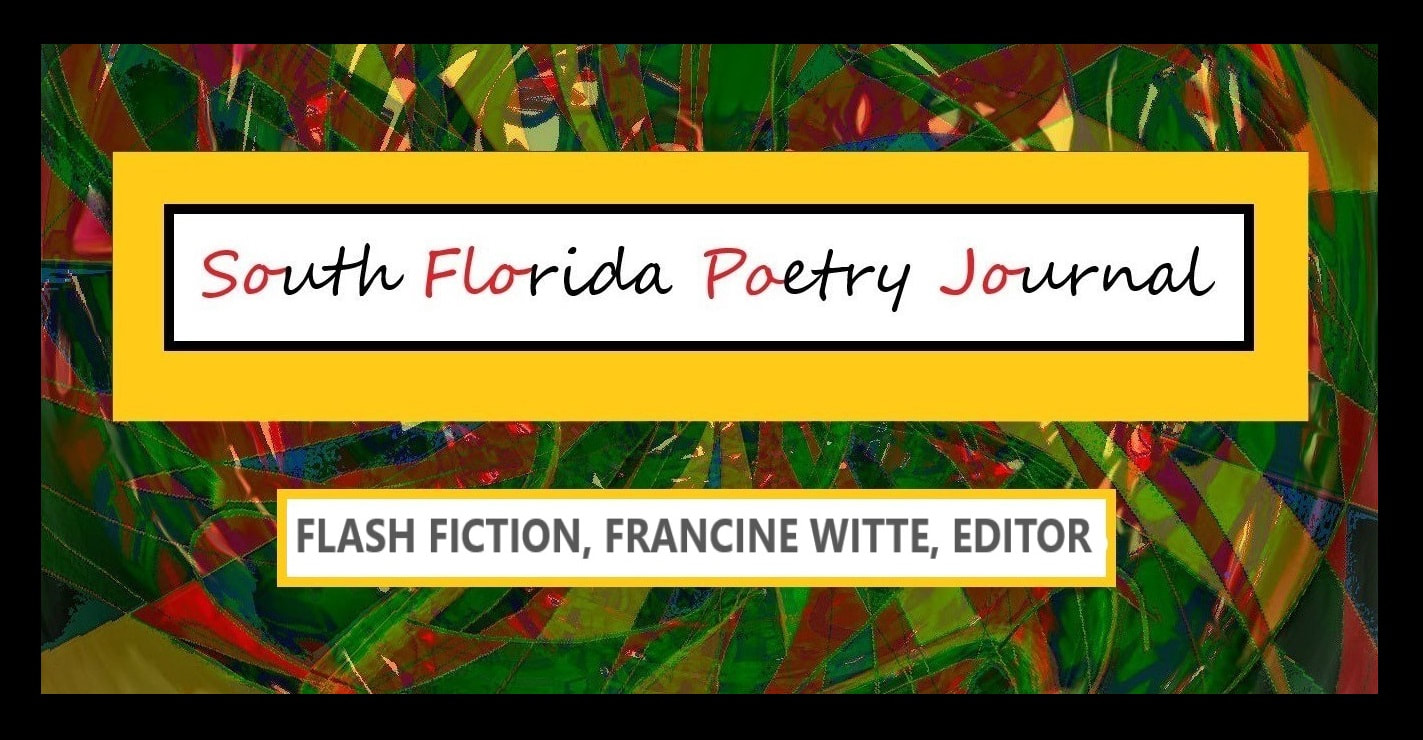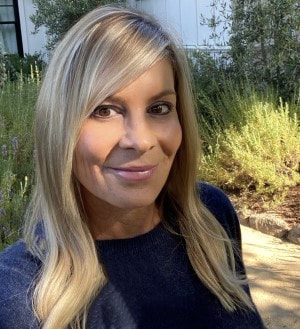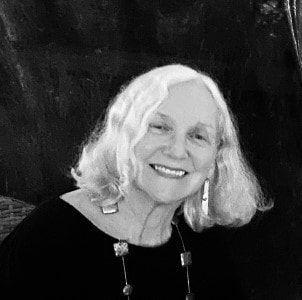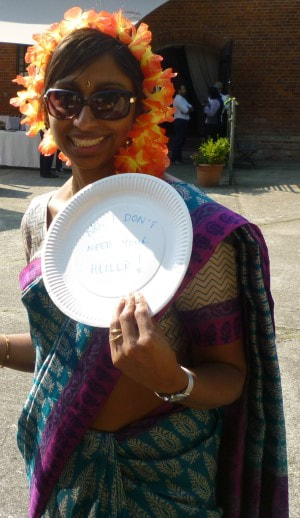
Please REGISTER & VOTE in all of your local, state, and federal elections; click here for more information. |
February 2024 Issue # 32 Flash
Authors: Tina Barry, Kelli Short Borges, Gary Fincke, MaxieJane Frazier, Gabrielle Griffis, L Mari Harris, Kathy Hoyle, Christopher Linforth, Jayne Martin, Kellene O’Hara, Pamela Painter, Sally Simon, Sumitra Singam, Kirby Wright, John Yohe
|
Flash Launch Reading Friday February 23rd
at 7 PM Eastern |
|
Tina Barry
|
I Tell Henrietta
The Swan Returns, this Time with a Russian Accent Before my daughter’s wedding, a swan slides through the dark folds of a lake. Ducks, feasting on bread crumbs near the water’s lip, raise their heads and shriek. Two clouds join and darken. Anyone can see it’s a sign. When the swan glides closer, I toss a hunk of bread that it snatches, then sails away like a feathered yacht. My mother told me a Russian folktale about a moustached tsarina infamous for cruelty and terrible gifts. I’ve accidentally given some thoughtless presents: A wedge of cheddar to a lactose-intolerant colleague. For a boyfriend, a birthday card addressed to my ex. I sent my dying aunt a plant that attracted swarms of flies. I can’t beat the tsarina, though, for originality. She hired artisans to carve a giant swan from ice, then forced a newly married couple to sleep in it. A long train trails behind my daughter’s white gown. I’d say she looks like a swan, but I’m afraid to jinx her. Zeus, Again Something about the guy in the bar bothered me: He grinned too broadly, as if my comments charmed him, leaned in too close as I spoke, was too easy in my company. I said yes, though, when he invited me to a Halloween party. Going through my mother’s closet weeks before, I discovered an old caftan in shades of neon rainbow, and welcomed the opportunity to swish around in it. On the night of the party, I opened the door to discover him dressed as an enormous swan. The costume seemed so lifelike, the eye black, glittering, feathers aflutter. Whoa! I said, and tried to back away, but his wings closed around me, one webbed foot wedged in the door. Vanessa I tell Henrietta about a lover, much older than me, with the library of a great scholar—a surprising perk from a man who sold girdles in the garment district. His room—15-foot ceilings, oak shelves groaning with tomes, a ladder waiting on wheels. In the corner, a desk of mellow mahogany sat grand on a Persian rug. I awoke in his bed, urgent to peruse his collection. On entering the room, one book glowed green. When I reached for it, a photo dislodged, fluttered to the floor. A woman stared. Currents of blue veins coursed as if she were a river contained in spume-pale skin. Ample hips tapered into a whirlpool. What was beneath the water’s surface, I didn’t know. A glittering fish tail? A shell pearlized pink? Turning the photo over, a name: “Vanessa.” I shook him gently from sleep. Tell me, I said. Upside of loss A man wooed me with lavish lilies, early morning phone calls, silly cards with kittens. After he moved in, he drew a line with a black Sharpie down the center of the refrigerator shelves, dividing his side and mine. If he made the bed, it was only his half, and he wanted to charge me for the popsicle I took from the freezer. The box had been clearly labeled with his name; I should have known better. When anonymous notes with words cut from newspaper appeared in my mailbox: The neighbors named their dog after you and Your friends are whores, I blamed him and kicked him out. A month later, my garden tomatoes inflated like red beach balls, yellow squash stretched long as ladders, dill grew tall as trees. I ate pasta primavera in his honor. Visitation I appreciated a memorable entrance, but a wolf howling and great whooshes of rain were a bit much. Death robbed my father of subtlety. And it was never enough to sense his presence―no whiff of cigar smoke or tinkling piano tune. No, I had to feel him shifting around in my torso, making a chair of my ribs. Then, looping behind my eyelids, a film of his memories, scratched black and white, all swans' necks and shadowed lashes: His girlfriend speaking in a phony southern accent, y’all got grits? Pale legs goosebumped against a damp gray pier. A nurse, jaunty cap bobby-pinned to dark hair, leaning towards him, Ed? |
Tina Barry is the author of Beautiful Raft and Mall Flower. Her writing can be found in SoFloPoJo, The Best Small Fictions 2020 (spotlighted story) and 2016, Trampset, A-Minor, the Maryland Literary Review, Rattle, Verse Daily, The American Poetry Journal, ONE ART: a journal of poetry, and elsewhere. Tina is a three-time Pushcart Prize nominee and has several Best of the Net and Best Microfiction nods.
Kelli Short Borges
|
Why I Did What I Did After Work Behind Titty McGees
Because my job was the only job in our small town, the only job for a woman like me, because my job was to parade as Little Bo Peep, to parade—was to smile, all blink and blue eyes, was to wear a short skirt, was to wear bloomers, was to wear a pink bow like a beacon a bow like a present a bow like a girl, was to offer to help men find what they’ve lost, what time has stolen, what time has erased, was to serve them Jack another round of Jack another round, to giggle, to flounce, to trifle with trouble, to pretend it was okay to grab my ass, to pretend it was okay to finger my bow, to pretend I liked it in the parking lot after, to pretend I liked it so they’d slip me a fifty, so I could pay rent so I could buy Pampers so I could buy food for my daughter, to pretend, so social workers wouldn’t take her, so I could send her to college, so she could earn a degree—so she might be something, so she could be something, so she would be something, better than me. |
Kelli Short Borges writes essays, short stories, and flash fiction from her home in Phoenix, Arizona. Her work appears or is forthcoming in Gone Lawn, The Tahoma Literary Review, Flash Boulevard, Cleaver, MoonPark Review, The Penn Review, multiple anthologies, and elsewhere. Kelli is a Best of the Net, Best Microfiction, and Best Small Fictions nominee. Often, you can find her at her favorite local bookstore, where she gobbles up lemon cake and books in equal measure. She is currently working on her first novel.
Gary Fincke
|
Summiting
Not exactly Mt. Everest, but we don’t have $100,000+ to spend, what some people call a bargain because summiting there is “singular” and loaded with “bragging rights.” Trust me, this one is semi-famous, snow-capped, at least, in July, and, for sure, we’re waiting in line to summit just like the Everest elitists when a wealthy mountaineer panics at one of the dangerous parts. Maybe you’ve seen that video, some goggle-wearing adventure-seeker stuffed into a bulky outfit balking at a reach-and-swing-and-hold-or-else-die-moment. A Sherpa coaxing. Fear forever documented. My wife keeps saying not to sound sour-grapy, (she calls it heartless) but I plan to post a video from my body-cam to prove we never hesitated while climbing a risky patch. Right now, the camera is off because there’s nothing to corroborate but other summiteers here where breath comes hard and discomfort easy. My wife, the bean-counter, says there are 68 in front of us, and I know not to challenge. Spending less, we expected to wait, but our foot traffic is clogged like Black Friday at the Miracle Mile Mall the year we were married. Ruby anniversary, I told my wife; let’s not wait for gold to try our luck with peril. Let’s do something so it’s memorable for more than the year or two we might have left after our fiftieth. We even trained for a few days, paying a mentor, a group lesson, economy package. Another couple, both looking decrepit, shared how excited they were to learn we were ruby-marrieds, too. Maybe they found each other late, I said, meaning a decade, easy. If our actuarial tables are right, we’ll have thirteen years, give or take some, to always remember overcoming the advertised hazards. My wife, the spoilsport, says she’ll never forget the money that went to gear, guide, and travel that’s gift-wrapped discomfort and impatience while we wait for our few thousand dollars-worth of terror. What else I’ll remember is that when some big mouth standing close to us declared we’re safer here than we will be driving home, I had to raise that bar by pointing out our home is a seven-hour drive, the back half through landscape where water and rescue are in short supply. When only shrugs followed that logic, I turned inward, concentrating on freezing in July, my wife in purple, me in green, what she chose for us at Summit Outfitters, that word so versatile it’s an adjective, too. Admittedly, things have soured. Even though we left Summiting Lodge at 5 AM today, hoping to beat the rush, here we are stalled at 8 AM surrounded by adventurers who probably thought the same way as us about anniversaries and birthdays and retirement presents, pre-paying for photographs and a certificate of achievement to frame. For sure, we’re all co-signers of a detailed waiver. “Don’t you fret. Today’s window is open wide,” our group-guide calls in a voice that suggests he might do a bit of yodeling on the peak, but anyone can see that the sun is safely above the horizon, nothing above us but blue sky and dozens of climbers and guides snaking up “Summit Leg.” Not much different than a backup on the first tee of my often-windswept golf course because of a surprise overnight freeze. Before we start moving, let me tell you a story. Last night, at dinner, I gave my wife a gag gift, an authentic replica of special summiting insurance, the kind that promises transportation of our bodies if we fall down a cliff or into an altitude-induced coma, the one that guarantees a thorough search for our bodies. She didn’t laugh or smile. She was icy. She folded it into her purse for what she said was “safekeeping.” Listen, I’m telling you that because I have to admit sorrow appears to have settled upon my wife as if this thrill, too, has gone the way BB King once warned us. “Orgasmic,” the guide said when we took our place in line a few hours ago, grinning at my wife as if suggesting she hasn’t enjoyed that in quite some time. He leered at me, too, maybe making sure he was being inclusive. It was too late to fire him, but I vowed not to tip afterward. After all, forty years is a summit, too, something we’d been standing on since midnight, though it seems, as my wife, the mountaineer, trudges, head-down, ahead of me, my body-cam recording nothing but her bent, but dogged posture, a steep and slippery metaphor. |
Gary Fincke's flash collection The Corridors of Longing was published by Pelekinesis Press in 2022. His newest book is The Mayan Syndrome, a memoir-in-essays (Madhat Press, 2023). Its lead essay "After the Three-Moon Era" was reprinted in Best American Essays 2020. He is co-editor of their annual anthology Best Microfiction.
MaxieJane Frazier
|
A Feminist History of You Stained knees in dungarees under your mother’s Virginia Slims veil. Duck and cover turned to lipstick and lover—moist tongue invitation. Female Help Wanted classifieds torched a Cross Your Heart, four-hooked bonfire; But his lips on your lips and down on those unspeakable lips kindled a raging desire. Gauchos and ponchos hid what grew; A garden illegal for weeding. “I do” because you did and there was only one way forward from there. Hamburger Helper, momma’s helper, teacher’s aid: every day stole the fire nestled in your ribs. Farewell to the babymaker whose younger bride, a slim Virginia, ducked under your covers with Lip Smacker shine and a two-hook Wonderbra. Her moist invitation a theft. Jane Fonda, stretch pants, Shakey’s Pizza dates with your tiny dancers by the stage. Your hand in a stranger’s hand. Your heart la-dubbing faster and faster. Fear tastes like desire. At first, you’re candy in tall boots and your V-striped, A-line skirt. Soon it’s cutlery rules in dishwashers, detergent rules in clothes washers, friend rules, hobby rules, money rules, more rules. After your dancers’ graduations, After your independent rise and early retirement, After your long, tan legs and backyard pool and rigor-mortis tap-dance smile, After you broke the rules, improbably setting yourself free. Now you’re a 3 p.m. margarita, sandals and slim skirts, Flash of flirt. No way you’ll follow up. Volunteer and sew and best friends with the woman next door. You hold your Chiweenie and wire-haired terrier. Make chili for one. Buy the big swim spa. Sleep with furry limbs tangled in yours. You’re stained knees in dungarees in the backyard garden. Duck under the gazebo cover, Lip balm and discover: who wants a lover? |
MaxieJane Frazier is a writer, teacher, editor, and retired military veteran from Riverside, WA. Her work is forthcoming or has appeared in Booth, Collateral Journal, Scribes*MICRO*Fiction, Bending Genres, The Ekphrastic Review, The Bath Flash Fiction anthology, and other places. MaxieJane holds an MFA from Bennington Writing Seminars and co-founded Birch Bark Editing where she is a co-editor for MicroLit Almanac.
Gabrielle Griffis
|
Trout Lilies
Mr. Nord and I step over a rotting log in the woods. A brook meanders through the trees as sun falls on the water and moss covered rocks. Mr. Nord is our neighbor. He babysits me after school while my mom is working. Before he moved in, I spent most afternoons by myself. Mom always left frozen dinners and canned pasta for me. I used to do my homework and watch TV by myself, but now Mr. Nord takes me on adventures. We go fishing and find different things to eat in nature. He says microwave pizza isn’t food. Today we are looking for trout lilies. Mr. Nord leads the way through the woods. Nearby a towhee searches for worms in the dirt. I stare at the back of Mr. Nord’s head, his white hair sticks out a little from under his hat. He wears a jacket with patches of flags and eagles from his time in the service and smells like Old Spice cologne. The ground is wet, still damp from being covered in snow. “Are you excited to taste spring?” He asks. “Yes!” I reply. Mr. Nord talks about tasting the seasons, about tasting the woods. He says the flavors of late March are different from late June, when wild strawberries ripen. “Everyone should know what the wild tastes like,” he says, and lists the reasons. He talks about sap and the veins of trees, about ferns, dirt, and moon colored fish. After some time, we find the lilies. They blanket the ground in green and yellow. Mr. Nord stoops and pushes back his sleeves. The tail from one of his mermaid tattoos peaks out as he unsheathes his foraging knife. I ask him why they’re called trout lilies and he says it’s because their leaves are spotted like fish, and they are - mottled with specks of brown. We watch bees pollinate their yellow, six-petaled flowers. They remind me of tiny easter lilies. “A trout lily colony can be hundreds of years old,” he says as we stand at the colonies’ edge. “How?” I ask. “Their roots spread underground,” he replies, leaning against a black oak. Mr. Nord harvests leaves, taking care not to damage the roots. He says trout lilies are some of the first to blossom, essential spring food for bees. They won’t come back if harvested improperly. We don’t take much, just a bit of green to taste. Chipmunks eat their corms, ants feed the outer parts of their seeds to their babies, and we eat everything. Squirrels skitter through the leaf litter, hunting insects and nuts. The forest canopy is barren. Soon the oaks will leaf out and the lilies will wither. The corms, roots, and rhizomes will stay alive in the dirt year round. We follow a deer path back to Mr. Nord’s truck. The dirt road is bumpy as we drive. We cross a wooden bridge over the river. There’s an old cemetery with a metal fence covered in moss. We pass twisted wood sculptures and cairns on boulders. Mr. Nord turns the radio volume on low. The stone walls seem never ending, and I ask Mr. Nord who built them. “A lot of people,” he says, explaining some of their history, old sheep herding and livestock trades. I imagine what the fields looked like before they were piled together like fences, if the fields were just littered with stones. I wonder how many sheep wandered the hillsides. Back at the apartment, a bicycle rusts in the yard. The neighbor’s swingset creaks with the wind. Mr. Nord washes the trout lily leaves and lets me try some. “We wouldn't want to eat a lot because it would make us vomit, but a little is okay,” he says. “Some people even use the flowers for tea.” I take a nibble. The taste is sort of sweet but also bitter, the way a lot of other green plants taste. Mr. Nord laughs at my expression, and gets out a pot to boil water for pasta. “Where did you learn about trout lilies?” I ask. “My grandfather,” he says, and tells me about how they used to fish and forage together. “He knew all the best spots. Frozen pizzas are tasty, but there’s something about knowing what the woods really taste like,” he says, winking and putting a trout in the pan. |
Gabrielle Griffis is a musician, writer and multimedia artist. She works as a librarian. Her fiction has been published in Wigleaf, Split Lip, Matchbook, Monkeybicycle, CHEAP POP, XRAY, Okay Donkey and elsewhere. Her work has been selected for Best Microfiction 2022 and has been nominated for Best Small Fictions and the Pushcart Prize. Read more at http://gabriellegriffis.com or follow at @ggriffiss.
L Mari Harris
|
Flight Pattern
In mid-October, an incisor fell to the ground. I scooped it up, along with fallen orchard apples. Branches snagged my new sweater. I told you there was something a little dreamy about this time of year—teetering, dynamic, yielding—something I wished I could capture in a little glass bottle with a diamond-shaped stopper. I bought a sun lamp in either late December or early January. The package insert stated it cured insomnia and despair. Seemed like a tall order, maybe a marketing ploy gone too far, but what is marketing, really, but hope? I then bought a bag of oranges and a pineapple. Sunshiny fruits. Fruits that made the sun lamp feel like that all-inclusive resort in Acapulco. My pipes froze during an arctic spell in March. I lit candles and placed them under the kitchen sink. I wrapped myself in my thickest blanket and watched them burn for most of the night, the fire extinguisher by my side. You’d bought it one Sunday afternoon when we were at the home and garden center. I’d told you—jokingly, I’d thought—how steadfast, how grounded, it made you look. You’d paused before laughing. We married in September. You left in a different September. One of my favorite things about you was how it always felt like I could talk to you about anything. I’d jot down little notes of all the things I didn’t want to forget: Like how the sun shone on that little girl’s face who lived down the block from us as she waited for the school bus. Or the guy at the coffee shop who insisted on an Americano without water, and the barista gave him a black coffee without blinking an eye. Or, when I had to take a detour to work because of road construction, I drove by this house with dozens of prayer flags tied to the elm in front. I said this last one was my favorite, that I never knew something so beautiful could be right there all along, how others drove past it every day without ever appreciating it, and how sad that was, Isn’t that the saddest thing you’ve ever heard? You’d said you had to think about it. I went to four weddings in June. I wore the same floral sundress every time and did not bother to wash the dress between wearings. I wanted to smell all four of the grooms on me, their scents mingling—colognes I couldn’t identify, tobacco, sweat. I’d hugged each groom, whispered the ink wasn’t dry yet, that they wouldn’t just be saving themselves. I’d whispered I knew that look in their eyes. It flashes just before a bird startles into flight. |
L Mari Harris’s stories have been chosen for the Wigleaf Top 50 and Best Microfiction. She lives in the Ozarks. Follow her @LMariHarris and read more of her work at lmariharris.wordpress.com.
Kathy Hoyle
|
Cockleshell Girl
The girl is a moss-swept rock, nestled amongst the others. She knows every one of them, all their curves and crags, generations of ancient fisherwomen in her blood. She is like them, yet not like them. She has dreams. She has notebooks hidden under pillows, filled with lists of far-off places. She is a cockleshell girl, hardy and salted, with a flint-eyed resilience the soft-sand boys who circle her could only ever dream of. She is rooted here, in this place, her grandmothers and great-grandmothers tethered to the cliffside watching her, waiting. She doesn’t need to see them to know that they are there. The girl longs to leave, buries train timetables inside the pages of her schoolbooks, saves coins in a glass jar she keeps wrapped in a knitted scarf under her bed. But how would she wake if not to a gull’s cry? How would she sleep without the cold-hearted lullaby of the North Sea? Home is a rockpool, her mother a limpet, clinging to a marriage lost long ago. Her father is a hermit-crab hiding in the half-light. Whenever the girl tries to follow him into dark places, he is gone, leaving only shards of shattered carapace. Is she too destined for a half-life of darkness and small-town secrets? At night, her older sister sings shanties while they huddle together in bed. The herring smoke creeps through the window, threatening to choke them in their sleep. Her sister is courted, hooked already. Soon the girl will sleep alone, chewing her nails in the darkness, her thoughts swirling. Are these my choices? Is this all I have? Smoke and sea, sea and smoke? The girl is on the cusp of womanhood. At the water’s edge she bellows out her dreams from a foghorn mouth. She spies a codling, tail shimmering in the water. The longing swells up inside her, pushing through her gut, her heart, her throat. It cracks her bones, splits her wide open and roars from her, cresting on the ocean’s tide. The salt – sting tears lash her cheeks. She is raw yet ready. It is time The girl inhales, breathing in the tide, the smoke, the shanties, the secrets, all that she knows. She grasps the tail of the codling and grits her teeth as it arches its sleek sliver back and pulls her out, out, into the wide ocean. Scores of ancient fisherwomen wail on the cliffs above, keening at the loss. A hollow cockleshell pitches on the shore. |
Kathy Hoyle's stories are published in literary magazines such as The Forge, Lunate, Emerge literary journal, Ellipsis Zine and Fictive Dream. She has won The Bath Flash Fiction Award and the Retreat West Flash Fiction Award. Other stories have been placed in competitions such as The Edinburgh Flash Fiction Award, the HISSAC Prize and The Cambridge Flash Fiction Prize. She was longlisted for The Wigleaf Top 50 2022 and her work has been nominated for Best Small Fictions, Best Microfictions and The Pushcart Prize.
Christopher Linforth
|
Reunion
My girlfriend disappeared in the winter of 95. The following spring her picture appeared on the side of a milk carton. Her lank hair framed her washed-out face. Not at all how I remembered her. She’d had messy braids and a silver nose ring. She always wore a Nirvana T-shirt. She liked to say Kurt wasn’t really dead, that he’d moved to Hollywood, changed his name to Brad Pitt. I didn’t have any pictures of her myself. In truth, we’d only been on two dates, both times to Mike’s Hamburgers, and devoured chocolate milkshakes and split a large portion of fries. She talked about LA, maybe finding a job out there, even tracking down the reincarnation of Kurt. We were both fifteen at the time, and I hadn't taken her too seriously. Then she vanished. I cut out the depressing mugshot of her—I’d no idea who’d taken this picture or why her parents had chosen this one—and showed it around town. “Shame about her,” most people said. At his hamburger joint, Mike snatched the picture from me, said she was a real beauty. He didn’t give me the picture back. Until the summer, I looked for another milk carton with her picture, but never found one. A few years later, when I came home from college at the Christmas break, I thought I saw her drive out of Mike’s parking lot, a kid in the back crying about something. |
Christopher Linforth's latest book is The Distortions (Orison Books, 2022).
Jayne Martin
|
Slipping Away
No one seemed to notice when she began losing adjectives. “A blue car” became “A car the color of the sky.” Which was fine unless the sky was gray that day. Sometimes her daughter would say, “Oh. You mean blue, Mom.” And she would get annoyed and say “I mean what I said!” in a tone a lot harsher than she intended. Nouns were the next to go. When her mind would not give up the word for “kettle” and she had to ask for “the thing that cooks water” or “phone” became “the thing you talk through” her family began to become concerned. When her apartment manager found her in the hallway naked and dripping water looking for “the thing that dries you off,” it was decided she could no longer live alone. Soon mouths from which she’d wiped cookie crumbs and cheeks from which she’d kissed away tears no longer held memory. And though these people visited her often and were always very kind, she missed her children. |
Jayne Martin is a recipient of Vestal Review’s VERA Award for flash fiction, and the author of Tender Cuts, a collection of microfiction from Vine Leaves Press and The Daddy Chronicles-Memoir of a Fatherless Daughter from Whiskey Tit Books. She lives in California with her dog, Miss Pickles, and her horse, Luna, but dreams of living in Paris. www.jaynemartin-writer.com Twitter: @Jayne_Martin
Kellene O’Hara
|
Heliotropism I. All the light, I cannot hold. Sunshine spills through my fingertips. Don’t look directly at the sun, they said. The sun might not exist. It may not be real. I have never seen it. Not directly. I want to believe in it. I want to believe in the sun. I have no proof. Light seeps through the door jamb, the luminosity of morning. II. Remember this. Remember this. When I am twenty-two, the sky is not the sky. The ocean is not the ocean. At the break of dawn, I cannot see the division of sky and sea. I only see color. I believe it starts in this moment, here. Cameras cannot capture the colors. Memory is all that can remain. Inside the horizon, I understand that it cannot be understood. It is the feeling, the feeling of the rising sun. I want to keep it. Remember this. Remember this. I walk to the beach, the edge of the world. The land begins and ends here, at my feet. The sun slowly collapses, tearing the sky along with it. Nearing the final crest of light, there is a bloody demi-circle on the waves. I stand until the burning blaze scorches me and the water turns black with time. A black hole settles on sea and sky. I stare. But I feel it sucking me in. I run away. I think part of me was taken. When I was young, I lived for sunrises. I wanted to see days ignite. How many sunsets and sunrises have there been? Plenty and not enough. One day, the sun will billow and bulge and swallow all of us. That is not today. Today is the day of the sleeping sun. Remember this. Remember this. I can feel the sun. I know it is there. My eyes are shut. I do not need them to be open. I want to feel what is visible. I want to feel what is obscured. I feel it happening – the sun rising, the sun setting. I feel it. I believe it. I see the sun as it rises. I see the sun as it sleeps. I see, I see, I see. III. The dying light is warmest. A final etching of sun into skin. Before the shadow of night, the evening breeze blows. Still, the pale light persists, burning hotly against the void, the absence of itself. I feel it on my shoulder, that dogged determination. The tenacity of touch. It doesn’t want to be forgotten. I do not wish to forget. I turn my face like a plant, twisting towards the sun. I crave the light. I need it. I want it. I force myself to remain. To feel for one moment. This moment is the only moment that matters. All other moments are oblivion. My eyes cannot hold the light. They are closed, useless portals of nothing. My skin clutches the illumination, traps it in the nerves. Signals are sent to my brain, electric codes that say: This is the sun. This is the sun. This is the sun. Over and over. A different relay now: cold, cold, cold. I cannot interpret the message. What is cold? The air? Me? Am I cold? I do not like the cold. I like the warm. I want warmth, above all else. I reach out my hand. I am only touching the cool atmosphere, the space between earth and beyond. There is no warmth now. It has been extinguished. I recall the previous moment. I remember the sun. Yes, I remember the warm sun. I hold on to the memory now, right at the fall of night. This seems critical, although I cannot say why. Living things crave sun. They need it. They want it. I am a living thing. I crave it. I need it. I want it. The moment fades from me, from my fingers, from my mind. What is it that I desire? I forget, I forget, I forget. I do not know what to search for in the night. I do not hold anything here. In the darkness, I let go. |
Kellene O’Hara has been published in The Fourth River, Marathon Literary Review, South Florida Poetry Journal, and elsewhere. Her story, "Words for a Puppet," has been published in Intermissions, an anthology from Grattan Street Press. She has an MFA in Fiction from The New School. Find her on Twitter @KelleneOHara and online at kelleneohara.com.
Pamela Painter
|
THE TIME BEING
Here we are in quarantine in our apartment that pre-Covid seemed a spacious place to be. A refuge after my combative days defending criminals in court, or Jackson’s evenings firing up medium-rare filets topped with slices of white truffle for demanding diners. Our refuge has become a cage. We prowl. We growl. He thwacks his meat cleaver like a judge with a gavel. I sniff around his stove for something I am sure is burning. He says it first, “For the time being…” but doesn’t finish. I repeat, “For the time being…” What an odd locution, but sadly I know what he means. A PRIVATE CONVERSATION My husband kept telling me we need to talk. To have a private conversation that lasts longer than the time it takes us to dress for work, or for me to rustle up omelettes for a family Sunday brunch or for him to open bottles of red wine before guests arrive. He kept telling me it wasn’t about us, even though I imagined an announcement that he wanted a divorce, or at least a separation, given our transgressions, both his and mine. But he said no it wasn’t that. And nothing to do with his law firm. And it wasn’t the kids, because once when he said we need to talk I asked if he was worried about the kids hanging with the wrong crowd, or getting hooked on alcohol or drugs, and he said no, nothing to do with the kids. I continued to evade that talk, that private conversation, by asking what it was about. After his suicide, immense regret accompanied my grief that I would never know the subject of that delayed conversation, what he must have agonized over and never said. I should have listened. I could have asked how can I keep you here? FILE A COMPLAINT When I was four, maybe even three I first remember hearing Mom say “If you don’t like it, file a complaint.” My sister Diana, who was six, didn’t like pigtails, and, Danny, at nine, hated vegetables. Mom told them, her tone matter of fact. “You don’t like it, file a complaint.” Which set Diana to sniveling. Danny had a long one-note wail. Me. I understood “complaint” before “file.” By the time, I understood “file a complaint” at eight, I also knew there was no “file” with someone waiting to hear my complaint about flute lessons, and no file ever came to Diana or Danny’s rescue. The dog barked at the neighbors, the cat hissed at our cousins, grandma said everything twice. We were a mess―a family full of complaints. You are wondering where Dad was in all this. He had his on-going complaints: he didn’t like leftovers left over more than one dinner. He didn’t like parent-teacher conferences. He didn’t like Mom working at Vinny’s car repair. He didn’t like Mom sending Danny down to the pub to remind him to come home. When mom told Dad to “file a complaint” he didn’t snivel or wail like Diana or Danny, or cry like me, he simply slammed out the door. These exits were always startling, especially since he’d often just come in that door from work or a night at the pub. One day Dad left and he didn’t come back. I guess Mom took her own advice and filed a complaint. But for her it worked. |
PAMELA PAINTER is the award-winning author of five story collections. Her stories have appeared in numerous journals and in the recent anthologies Flash Fiction America, Best Microfiction of 2023, and Best Small Fictions 2023. She has received three Pushcart Prizes and her work has been staged by Word Theatre in London, New York, and LA. Her story, “Doors,” has been made into a short film. She lives in Cambridge, MA.
Sally Simon
|
This little piggy went to market
with her mother to buy eggs and bread. Little did she know eggs aren’t the only things that can crack. There’s more than one way to kill a pig. The slaughterhouse is the quick and painless version of this story. This little piggy wasn’t so lucky. This little piggy stayed home. Little did she know not all homes are safe. Mothers can crack like eggs and they can’t be fixed. Staying home means hiding before Sunday dinner. Sometimes hiding can last for days and weeks. Staying at home is not the quick and painless version of this story. This little piggy prayed some day she’d be found. This little piggy had roast beef on her plate for Sunday dinner, never asking from where it came. Little did she know there’s more than one way to kill a cow. Mothers can overcook beef and it can’t be fixed. Throwing the leftovers in the trash is the best version of this story. This little piggy tried to have none, but sometimes she was hungry. Sometimes, this little piggy had none. Days and weeks went by and still no roast beef on her plate for Sunday dinner. She was hungry. Little did she know starving is preferable to slaughter. There’s more than one way to kill a pig. There is no version of this story that isn’t painless. For days and weeks, this little piggy cried. This little piggy cried “Weeee” all the way home before she remembered not all homes are safe, that mothers can crack like eggs, that in this version of the story it’s only a matter of time. |
Sally Simon (ze/hir) lives in the Catskills of New York State. Hir writing has appeared in Citron Review, Emerge Lit, Raw Lit, and elsewhere. When not writing, ze’s either traveling the world or stabbing people with hir epee. Read more at www.sallysimonwriter.com.
Sumitra Singam
|
The Truth of Night-Time Things
And you worked so hard with your feather-light touch. You asked, whispering hot in my ear, how do you like it? You forgot your own needs, focused lantern-jawed on me, smile crinkling the corners of your eyes like waves on the sand. And you were the ocean I wanted to drown in, just fall, fall, fall into. But I am a bottom-dweller, the mud sucks me in with squelching certainty, and I can’t move, I can’t move. I can’t be responsible for what I might do to you. I watch from my shielded distance, the waves swelling between us like reality, like the future, like my past. I watch as I zoom out, as I become a speck. And I want to dive right in, I want to really feel you, feel how we might fit together like a tessellation, and I want to forget my body in yours, I want to leave it behind in this wet resting place. But my body knows the truth of night-time things. It turns away, to what feels safe, but is really just alone. You are not angry, or sad. Your eyes say a worse thing – that you knew I would do this. You smile, heavy and deep, and you leave this story. You don’t see me crack and shatter with the pressure of the ocean. You’re not there for my tired trudge through the shipwreck redeeming what I can. You aren’t there to help me rebuild myself, check if this piece goes here or there. You can’t hand me the glue. You drift on Oyashio/Kuroshio/Agulhas to places where my vernacular cannot reach you. And I wish you well. I do. I see myself seeing you with someone else, hands grasped so loosely it might not even count, but it is enough for you two. I watch from my safe-alone distance, the life that might have been mine. I envy her, want to feel that looseness in her shoulders, want to feel like I might trust you. But my body. And the truth it knows. It curls into itself, like it might be an embryo. Like it might start again. Like it is just waiting for the night to end. |
Sumitra Singam is a Malaysian-Indian-Australian coconut who writes in Naarm/Melbourne. She travelled through many spaces, both beautiful and traumatic to get there and writes to make sense of her experiences. She’ll be the one in the kitchen making chai (where’s your cardamom?). She works in mental health. You can find her and her other publication credits on twitter: @pleomorphic2
Kirby Wright
|
DAVY BYRNES’ PUB, DUBLIN
Howls from Davy Byrne’s rattle the Duke Street cobbles. Next comes a baritone singing “American Pie.” In I go. Aroma of fried fish. I scoot past diners spooning watery chowder to find a seat at the bar. Millennials crowd around a James Joyce portrait. His later years. The bearded singer croons about a levee, drink, and death. Men adopt McGregor personas swaying with stout. The wall mural depicts a fedora man dancing at sunset with a country woman. Celebrating the harvest? A grandpa plucks a burnt carrot out of a condiment cup and munches it. Trinity coed beside me sips her Beamish. She wears a Kelly-green scarf and a college cap. Hair black as the Liffey. “I’m majoring in sonnets,” she confesses, alabaster skin glowing. “I do pantoums,” I reply. Her eyes roll, as if I’m sudden reptile. I sip whiskey through stinging lips. Last night I dreamt of a skinny castle in a field of cows and gulls camped on a cell tower. The coed sticks a heel on top of my boot. “Show me your verse,” she smiles. |
Kirby Wright was born and raised in Hawaii. He was a guest lecturer at Trinity College Dublin.
John Yohe
|
What She Learned From Her Mother
That you don't have to settle for anything ever—if your husband won't grow with you, you can leave him. If you don't like your job you can leave it. You can even leave if you don't like being a parent. She learned how to live poor and survive on part-time jobs and that when there is money you should spend it and enjoy. She learned how to cook for two, or one, but that it's ok to just get pizza. She learned to be naïve, to expect people to be decent, and to be angry when they're not, and to carry that anger all her life. She learned that the most effective way to hurt somebody and transfer your anger is to write a letter so you don't have to talk face to face or even on the phone. She learned to follow her interests but also how to never learn anything in depth and still pretend to be an expert. She learned to love books and find her friends and teachers in them. She learned to be ok with doing things other people, especially relatives, disapprove of, and that you can get on a plane fly to another country and survive—live even. She learned how to move and keep moving and how to be alone. |
Born in Puerto Rico, John Yohe has worked as a wildland firefighter, wilderness ranger and fire lookout. Best of the Net nominee x2. Notable Essay List for Best American Essays 2021, 2022 and 2023. @thejohnyohe www.johnyohe.weebly.com
Editor's note: See John's words in our Poetry Issue #32 as well.
Editor's note: See John's words in our Poetry Issue #32 as well.














